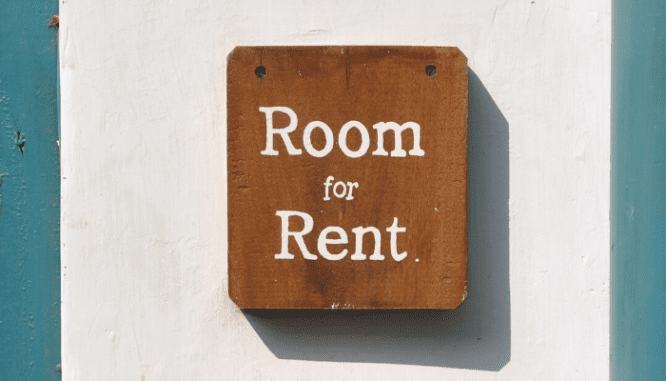I Am House Poor — Now What?! 8 Solutions to Your Problem
- Published on
- 4 min read
-
 Kim Dinan Contributing AuthorClose
Kim Dinan Contributing AuthorClose Kim Dinan Contributing Author
Kim Dinan Contributing AuthorKim Dinan is a writer, journalist and author. She's the outdoor news editor at Blue Ridge Outdoors and writes regularly for her local paper in Asheville, NC, covering everything from the necessity of home inspections to trends in the local economy. Kim is also the author of "The Yellow Envelope," a memoir about the time she sold her house and traveled around the globe.
After going over your budget again and again, trimming the excess yet still feeling the squeeze for months, it’s time to face the facts: You’re house poor. Your mortgage payment is eating up so much of your monthly income that you’re struggling to pay the rest of your bills. This way of living isn’t exactly what you signed up for as a homeowner — so what can you do about being house poor?
Though it may not feel like it right now, your mortgage payment does not have to ruin your life. Although you’re house poor, you do have options.

But first, let’s talk about how to prevent being house poor
A sudden job loss or a medical emergency can send even the most financially responsible person into a tailspin.
“Unexpected things happen in life,” says Dawn McCurdy, a top-selling real estate agent in Albany, New York. That’s why McCurdy says that one of the first things she does with her clients is help them determine a budget.
“What the bank and financial advisors will tell you is that people should spend no more than 28% of their gross monthly income on their housing expenses — that includes principle, interest, taxes, and insurance — and no more than 36% on debt, including student loan, car, and credit card payments,” says McCurdy.
She also recommends having a six-month emergency fund. “You should have that tucked away just in case anything happens,” she advises.
This is great advice, of course, but it may be too late for you right now. Keep it in mind, however, so you don’t find yourself here again.
But let’s meet you where you’re at. If you are house poor today, here are some options.
Option 1: Pay as much toward your mortgage as you can
This might feel counterintuitive, especially when you’re already struggling to make your monthly payments, but the lower your mortgage principal balance is, the faster you can clean up your situation and stop being house poor.
That’s because if you put less than 20% down on your home when you purchased it, you’re paying private mortgage insurance (PMI) each month. PMI rates vary but are generally between 0.5% and 1% of your loan amount.
The good news about PMI is that it disappears when you accrue 22% equity in your home (and you can also apply to have it dismissed when you reach 20% equity). So, the more you put toward the principal of your mortgage each month, the quicker you can drop your PMI and save money on your mortgage payment each month.
Even if you aren’t paying PMI, paying down the principal on your mortgage balance will put you in a stronger position for refinancing and lowering your monthly payment down the road.
Option 2: Limit your spending
Your mortgage is most likely a fixed expense — but there are probably plenty of other places in your life where you can trim your spending.
“Look at the household goods you are purchasing,” advises McCurdy. “Do you really need to go to Starbucks every day? A $5 or $6 coffee doesn’t seem like a lot, but the compound effect of that is over $100 a month. Whether it’s Wal-Mart or Target, if you eliminate the little things you buy, it can save you hundreds per month.”
McCurdy also advises cash-strapped homeowners to see if there are ways to consolidate their debt. “Right now, many people have extravagant student loans. Although debt consolidation doesn’t have anything to do with your house, your consumer debt is probably one of the reasons you don’t have enough money for your household needs,” she says.

Option 3: Reduce the cost of your monthly bills
Cutting back on your spending is one way to keep more money in your pocket, but another helpful way to accomplish the same thing is to reduce the cost of your monthly bills. Take a close look at the bills you pay each month. Is there any way to lower or eliminate some of them?
For example, could you bundle your home insurance and car insurance and save some money? Could you lower your thermostat or reduce your cell phone data plan? McCurdy says that she will often gift her clients with a professional home-energy audit, which points out ways they can save electricity (and money).
“I know it’s simplistic, but if you are house poor, you’re in the position where every $50 or $100 really does matter.”
McCurdy also points out that many states and counties have grants that assist homeowners in their efforts to become more energy-efficient — which will save you money in the long run. “You may find grants to put new windows in your home, help with siding, or replace your heating system,” she says.
In fact, McCurdy says one of her clients installed a gas water heater and saved $150 per month by making the switch. “In less than six months, she will recover the cost of the purchase and install — just by switching from electric to gas.”
Option 4: Find a side hustle
There are two ways to pull yourself out of the house-poor hole you are in. You can either reduce your bills to lessen the strain, or you can make more money.
So, let’s focus for a second on getting more cash in your pocket. Do you have skills you can use to freelance? Do you have a car you can drive for rideshare? Can you walk dogs, get a second job bagging groceries, wait tables, or babysit? In addition to earning more money, you’ll be working so much you’ll have less of an opportunity to blow your hard-earned cash on shopping or eating out (bonus!).
Option 5: Sell some things you don’t need
Chances are, you’ve got a whole lot of stuff hiding away in your basement, attic, closets, or spare bedrooms that you just don’t need. Why hold on to that stuff? Sell it!
While you might not make a lot of money from one individual item, selling as much as you can does add up. In fact, there are loads of personal finance websites that will teach you the ins and outs of selling your unwanted stuff online. Here are a few:
- Selling Your Stuff for Cash? Here Are the Best Ways to Do It
- How to Make Money by Selling Your Stuff
- Raise Extra Money by Selling Stuff
If you’re crafty, you might also consider selling your creations online via sites like Etsy.

Option 6: Rent some of your extra space
If you’re finding it hard to scrape together your mortgage payment, consider having your house work for you. In other words, can you offset your mortgage by getting a roommate who can pay rent? If you’re in an Airbnb-friendly area, can you put a bedroom, basement, or even the whole house up as a short-term rental?
You may not love the idea of taking on a roommate or allowing short-term renters into your home, but if you’re desperate to get your head above water, this is one of the most effective methods to put cash into your pocket pretty quickly.
Option 7: Refinance
If you can refinance — especially after implementing one or more of these other options — it’s possible you may be able to get a new mortgage loan with a different rate and lower monthly payments.
If you’ve owned your home for a couple of years or more, mortgage rates might have dropped since you got your loan. You may also have more equity built up in your house now, which means that you could potentially drop your private mortgage insurance and lower your monthly payment even more if you refinance.
Option 8: Sell and downsize
No one wants to feel forced to sell their home, but if you are house poor and can’t find another way to pay your bills each month, this may be your last resort — and it’s better than foreclosure!
If you really struggle to make your mortgage payments, it could mean you just need to sell. Look at your equity and the current market; if you’ve been in the house for more than two years, you can avoid capital gains taxes when you sell. If you’ve been in the home for less than two years, is it possible for you to hang on until you’ve passed the two-year mark to avoid paying capital gains taxes?
Once you decide to sell, talk to a real estate agent about what you could get for your house, and what your options for downsizing would be. Then take special care to make sure you don’t end up house poor again!
We know it’s not a comfortable place to be, but by implementing one or more of the options above, you should be able to make your current situation a passing phase instead of a permanent state.
Header Image Source: (Pixabay / Pexels)
